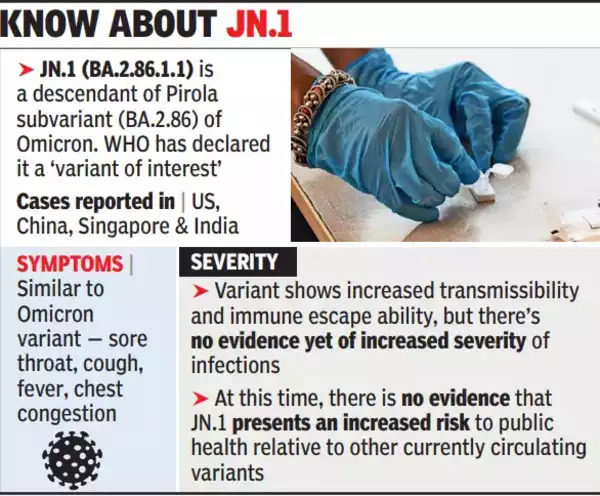Thus far, this sub-variant has been found in over 20 instances across the nation; the first was reported on December 8 in Kerala.
Although the strain is considered a gentler descendant of the Omicron sub-variant, increased caution and vigilance are necessary due to the rising frequency of illnesses and fatalities.
 Source: The Times of India
Source: The Times of India
The number of active Covid-19 cases has surpassed 2,300, with over 600 new cases reported in India on Wednesday—the largest number since May 21. According to the Union Health Ministry, the number of deaths has increased to 10 — eight in Kerala and one in each of Uttar Pradesh and Karnataka.
Individuals in the impacted areas need to follow the Covid-19 protocol, which they should all be familiar with: public masking, preparedness, and heightened surveillance for states and UTs; in the event that a person exhibits flu-like symptoms, get tested; if the results are positive, follow the four to five days that this contagion usually takes to run its course.
Source: WION
Although the WHO reports that JN.1-related symptoms range in intensity from mild to moderate, individuals with weakened immune systems should exercise extra caution. It has been discovered that immunity obtained via immunisation or Omicron breakthrough infections is effective.
Designated as a Variant of Interest, it is spreading significantly faster and is the cause of the surge in Covid cases in 35 countries, including Singapore, Malaysia, Spain, the US, and Brazil. The majority of infections worldwide are of the JN.1 kind. September saw the first sighting of JN.1 by US authorities. As anticipated, SARS-CoV-2, the virus that caused Covid-19, is still present in the world and continues to evolve and mutate, keeping health systems vigilant. To counter a potential threat from the fatal virus, prudence is required.
What do you think about this? Comment below.

